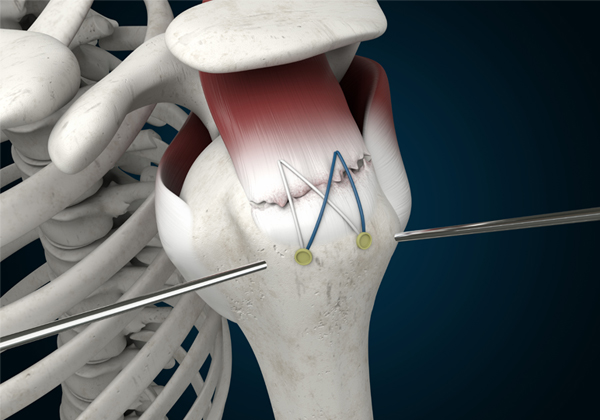Understanding Rotator Cuff Repair Surgery: When is it Needed and What to Expect
Overview
The rotator cuff is a group of muscles and tendons that helps you lift and rotate your arm. When these tendons tear, they sometimes require surgery for repair. This information explains what to expect from arthroscopic rotator cuff repair surgery.
Who needs rotator cuff repair surgery?
This surgery is not suitable for all rotator cuff tears. It’s typically considered for:
- Large tears: Larger tears tend to worsen over time, leading to more pain and limited movement.
- Persistent pain: If pain from a rotator cuff tear doesn’t improve with other treatments like physiotherapy, surgery might be an option.
- Significant weakness: Severe weakness in your shoulder can significantly impact daily activities, and surgery might help restore function.
What to expect during surgery:
- Arthroscopic procedure: This is a minimally invasive technique using a small camera (arthroscope) inserted into the shoulder joint. Images are displayed on a screen, guiding the surgeon in using miniature instruments for repair.
- General and regional anesthesia: You will be asleep (general anesthesia) and have a nerve block (regional anesthesia) to numb the area around the shoulder.
Recovery after surgery
- Sling: Your arm will be immobilized in a sling for about 4 -6 weeks to protect the repair.
- Gradual movement: While wearing the sling, you will be guided by your surgeon and physiotherapist on safe and controlled movements to promote healing.
- Rehabilitation: Physical therapy is crucial for regaining strength and movement in your shoulder. This typically starts after 6 weeks and can take several months.
- Restrictions: Lifting heavy objects and strenuous activities might be restricted for at least 3 months to allow proper healing.
- Recovery time: It can take a minimum of 3 months before you feel a noticeable improvement in your shoulder function.
Additional points to remember
- Good quality rehabilitation is essential for a successful outcome.
- The size and severity of the tear can affect recovery time and the final outcome.
- Early diagnosis and treatment of rotator cuff tears can lead to better surgical results.
Disclaimer
This information is intended for general knowledge only and does not constitute medical advice. Always consult your doctor for diagnosis and treatment recommendations.

